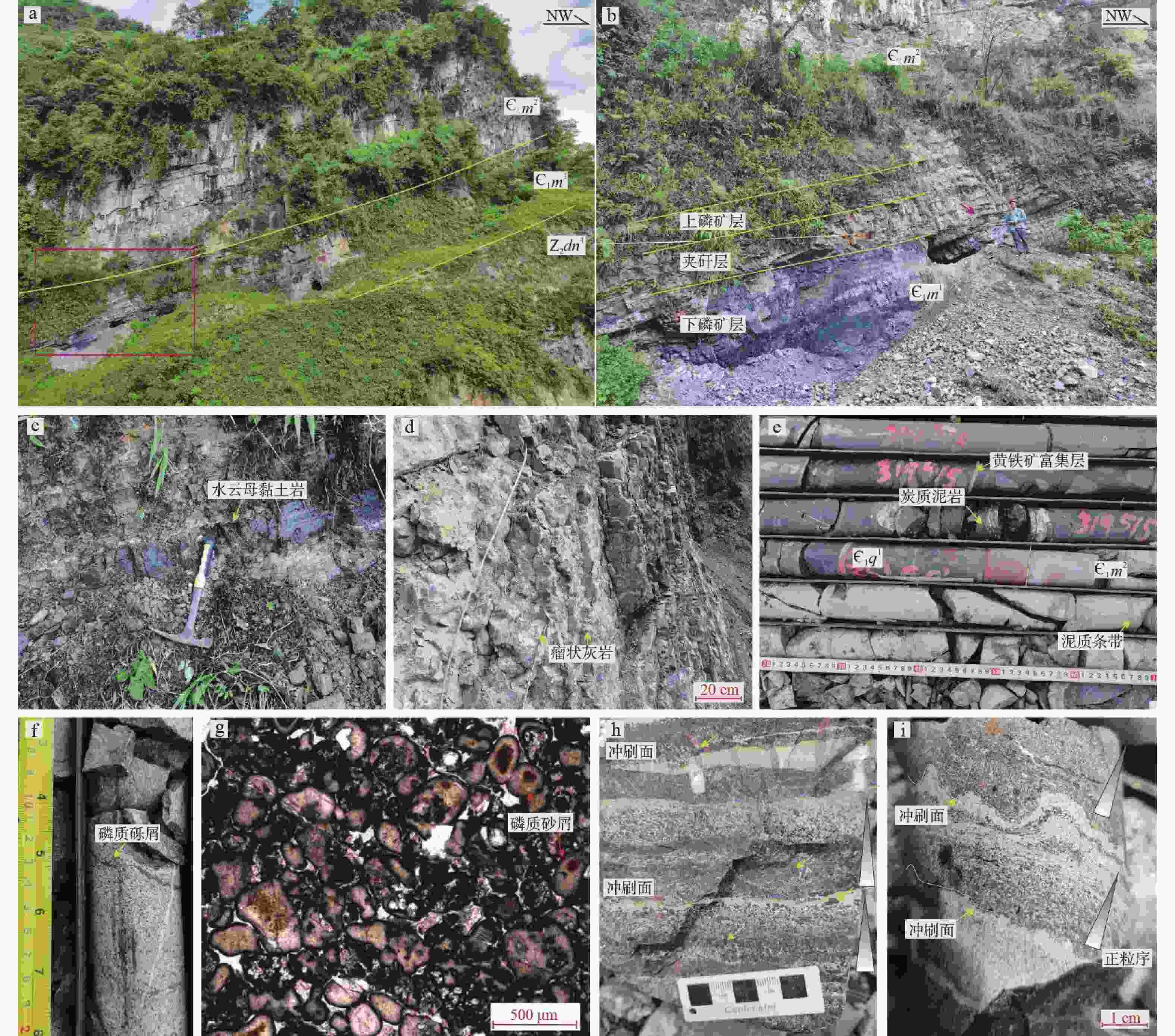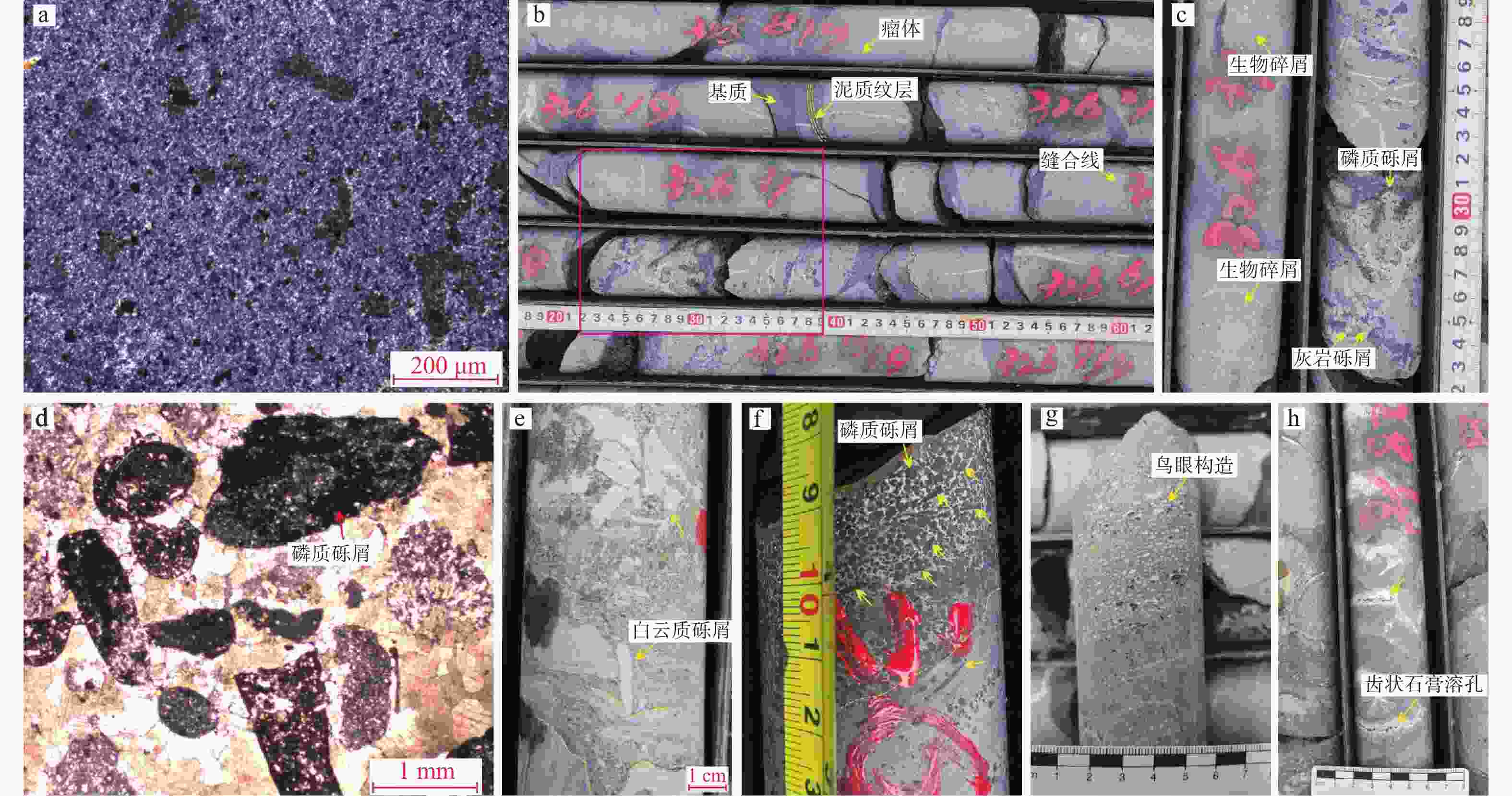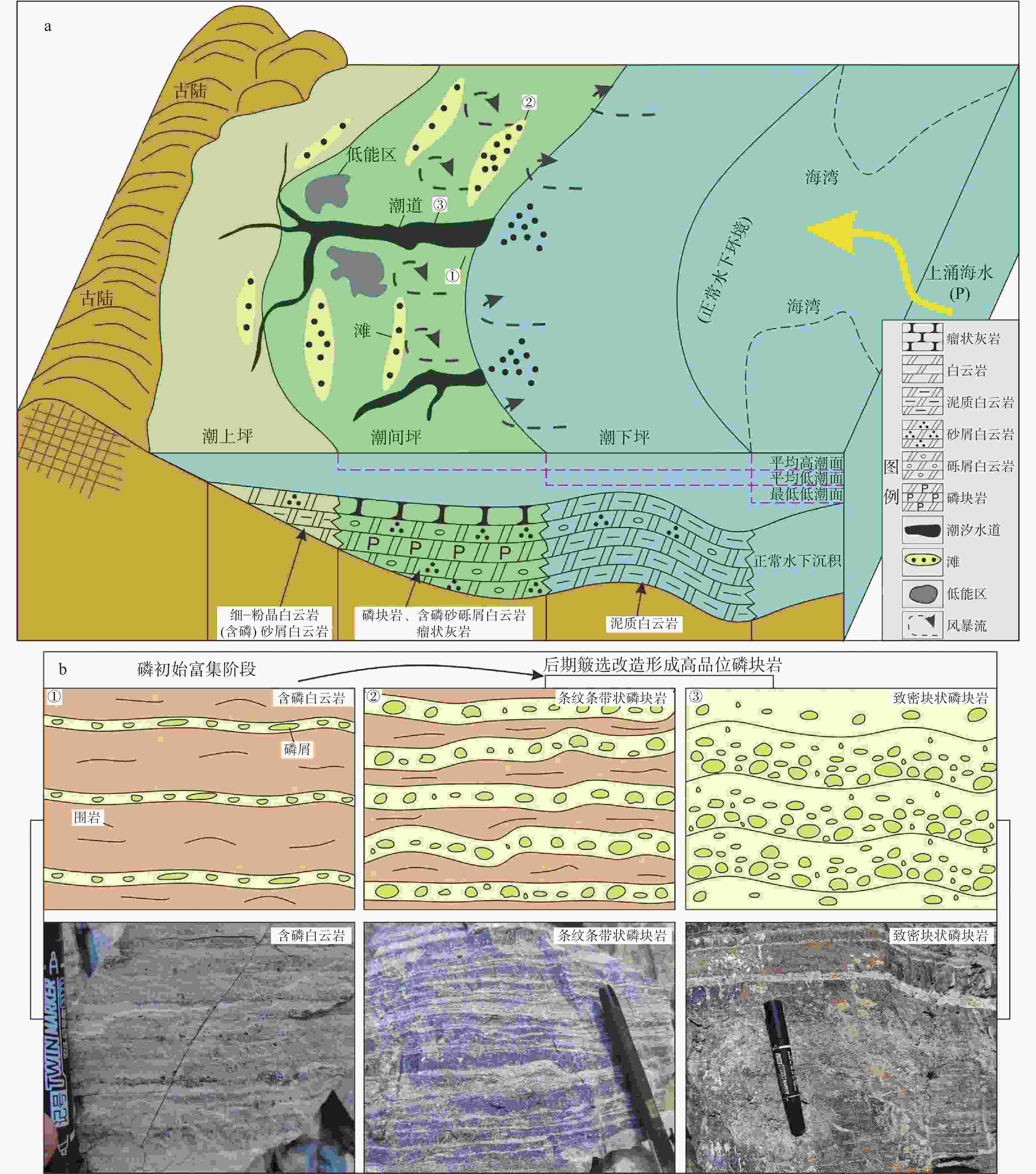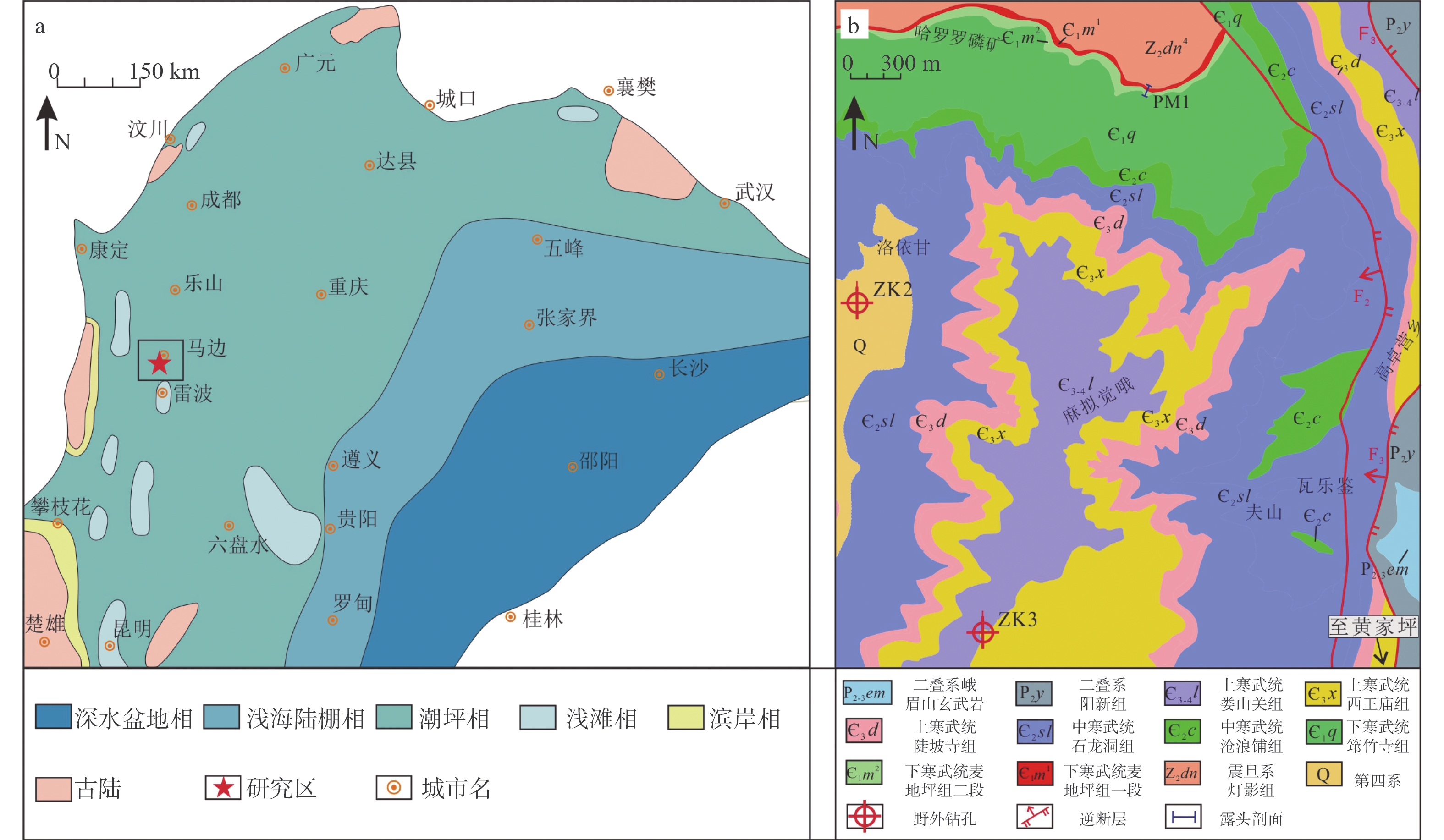Sedimentary facies characteristics and metallogenic model of the lower Cambrian Maidiping formation in the Huangjiaping phosphate deposit, Mabian County, southern Sichuan
-
摘要: 川南马边地区下寒武统麦地坪组是昆阳式磷矿的重要赋矿层位,磷矿的分布受沉积古环境控制。以马边黄家坪地区麦地坪组含磷地层野外剖面实测及钻孔岩芯观察为基础,对麦地坪组沉积相特征、磷块岩特征、磷矿成因模式进行了详细研究。研究表明:黄家坪地区麦地坪组发育碳酸盐岩潮坪相沉积,可识别出潮上坪、潮间坪和潮下坪3个亚相共计6种微相类型:潮上坪包括潮上滩和潮上云坪微相;潮间坪包括潮汐水道、潮间滩、潮间灰坪;潮下坪则仅发育低能潮下坪,垂向上表现出海退−海侵的沉积演化序列。据此建立了麦地坪组海湾潮坪相沉积模式。磷块岩的富集严格受沉积相带控制,潮间坪内高能水动力的潮间滩和潮汐水道是最有利于磷块岩形成的微相环境,砂砾屑磷块岩是马边地区发育较为广泛的磷块岩类型。磷矿床的成矿模式为上升洋流将富磷海水带入到海湾潮坪环境内,受生物−化学作用使磷以胶体−化学的形式发生凝聚富集,形成半固结—弱固结的磷酸盐沉积物,后遭受水流的冲刷、破碎、搬运、簸选再次发生沉淀,经压实、固结即形成高品位的磷块岩。Abstract: The lower Cambrian Maidiping formation in the Mabian area of southern Sichuan is a crucial ore-bearing horizon for Kunyang-style phosphate ores. The sedimentary paleoenvironment controls the distribution of phosphate ore. Based on the field section measurements and borehole core observations of the phosphorus-bearing strata of the Maidiping formation in the Huangjiaping area of Mabian, the characteristics of the sedimentary phases, phosphate massifs, and the mode of phosphate ore genesis of the Maidiping formation were studied in detail. The study shows that the Maidiping formation has developed carbonate tidal flat sedimentary facies, and six micro-phases can be identified in three subphases: supratidal flat, strand flat, and subtidal flat. The supratidal flat includes supratidal beach and supratidal dolomite flat; the strand flat includes tidal channel, intertidal beach, and intertidal limestone flat; the subtidal flat is only developed with the low-energy subtidal flat, showing a sedimentary evolution sequence of sea recession and sea erosion in the vertical direction. Based on the finding, we established the bay–tidal flat depositional model in the Maidiping formation. The sedimentary facies strictly controls the enrichment of phosphorite, and the intertidal beach and tidal channel with high energy hydrodynamics in the strand flat is the most favorable environment for phosphorite formation. The sand–gravel phosphorite is the most widely developed phosphorite type in the Mabian area. The mineralization mode of phosphate deposits is that the rising ocean current brings phosphorus-rich seawater into the tidal flat environment of the bay, and the phosphorus condenses and accumulates in the form of colloid-chemical, by biological and chemical interactions, forming semi-solidified and weakly-solidified phosphate sediments, which are then subjected to water scouring, crushing, transporting, and precipitation again, and then formed into high-grade phosphate masses after compaction and consolidation.
-
Key words:
- Mabian area /
- Maidiping formation /
- sedimentary facies /
- phosphorite /
- metallogenic model
-
图 1 研究区区域地质背景图
a—中上扬子区早寒武世梅树村期沉积古地理图(牟传龙等,2012);b—四川马边县黄家坪磷矿北东部矿区地质简图
Figure 1. Regional geological map of the study area
(a) Sedimentary facies and palaeogeography in the middle-upper Yangtze area during the Early Cambrian Meishucunian (Mou et al., 2012); (b) Geological sketch of northeast Huangjiaping phosphate deposit, Mabian County, Sichuan Province
图 3 马边黄家坪磷矿下寒武统麦地坪组典型沉积特征和显微镜下特征
Є1 m 1—麦地坪组一段;Є1 m 2—麦地坪组二段;Z2 dn 4—灯影组四段a—麦地坪组宏观照;b—磷矿层宏观照(图3a中方框放大),箭头处见硅质白云岩透镜体;c—水云母黏土岩;d—瘤状灰岩;e—筇竹寺组炭质泥岩与麦地坪组白云岩呈平行不整合接触;f—含磷质砾屑白云岩,砾屑杂乱分布;g—砂屑磷块岩,砂屑多呈圆形、椭圆形,填隙物多为不规则状泥晶胶磷矿及白云石(+);h—砂砾屑磷块岩,发育多期冲刷面、正粒序层理组成的沉积序列;i—砂砾屑磷块岩,发育多期冲刷面、正粒序层理组成的沉积序列
Figure 3. Typical sedimentary features and microscopic characteristics of the lower Cambrian Maidiping formation in the Huangjiaping phosphate deposit, Mabian County
(a) Macrophotograph of the Maidiping formation; (b) Macrophotograph of the phosphorite layer (enlarged by the box in Fig 3a), and siliceous dolomitite lenticle is seen at the arrow; (c) Hydromica clay rock; (d) Nodular limestone; (e) The carbonaceous mudstone of the Qiongzhusi formation is in disconformity with the dolomites of the Maidiping formation; (f) Phosphorus-bearing dolomite with phosphorus gravels disorderly distributed; (g) Arenite phosphorite, mostly with round, oval arenite and irregular micritecollophanite and dolomite as interstitial materials (+); (h) Sand-gravel phosphorite, developed with a sedimentary sequence consisting of multi-stage scouring surface and normal graded bedding; (i) Sand-gravel phosphorite, developed with a sedimentary sequence consisting of multi-stage erosion surface and normal graded bedding Є1 m 1–the first member of the Maidiping formation; Є1 m 2–the second member of the Maidiping formation; Z2 dn 4–the fourth member of the Dengying formation
图 4 马边黄家坪磷矿下寒武统麦地坪组一段磷矿层沉积特征和显微结构特征
a—条纹条带状磷块岩,夹硅质透镜体,磷块岩呈透镜状断续分布;b—致密块状砂砾屑磷块岩,夹少量白云质条纹;c—含磷白云岩,发育脉状层理;d—砂砾屑磷块岩,发育微波状层理;e—砂屑磷块岩,发育磷质鲕粒结构,磷质颗粒周缘发育磷质环边包壳,长轴方向具有一定定向性(+);f—硅质白云岩,发育硅质条带、水平纹层;g—含磷硅质白云岩,夹硅质透镜体; h—含磷细晶白云岩(+);i—磷质细晶白云岩,胶磷矿多为椭球型或不规则型砂屑(+);j—含磷硅质白云岩,夹硅质透镜体,具水平层理;k—含磷水云母黏土岩,具水平层理
Figure 4. Sedimentary features and microstructures of phosphate rocks in the first member of the lower Cambrian Maidiping formation in the Huangjiaping phosphate deposit, Mabian County
(a) Banded phosphorite, intercalated with siliceous lenticle, is intermittently distributed in a lenticular pattern; (b) Dense massive sand-gravel phosphorite interspersed with dolomite stripes; (c) Phosphorus-bearing dolomite with veined beddings; (d) Sand-gravel phosphorite with micro wavy beddings; (e) Arenite phosphorite, with phosphorus oolitic structure. Phosphorus crust is developed around the grain, with certain orientation along the long axis (+); (f) Siliceous dolomitite with siliceous bands and horizontal laminations; (g) Phosphorus-bearing siliceous dolomitite intercalated with siliceous lenticular; (h) Phosphorus-bearing fine-crystalline dolomite (+); (i) Phosphorous fine-crystalline dolomite, and collophanites are mostly ellipsoid or irregular arenes (+); (j) Phosphorus-bearing siliceous dolomitite intercalated with siliceous lenticular and horizontal beddings; (k) Phosphorus-bearing hydromica clay rock with horizontal beddings
图 5 马边黄家坪磷矿下寒武统麦地坪组二段沉积构造和显微镜下特征
a—黏土岩,具泥状结构(+);b—瘤状灰岩,瘤体内含较多生物碎屑及磷质砾屑,瘤体边缘有明显的溶蚀痕迹,基质为泥质;c—瘤状灰岩(图5b中方框放大);d—含磷屑细晶白云岩,见部分胶磷矿砾屑包裹细小白云石、石英颗粒(+);e—含磷屑砾屑白云岩,可见棒状砾屑直立分布;f—含磷质砾屑细晶白云岩,砾屑具定向性;g—细−粉晶白云岩,发育鸟眼构造;h—含磷屑白云岩,发育齿状石膏溶孔
Figure 5. Sedimentary characteristics and microscopic characteristics of of the second member of the lower Cambrian Maidiping formation in the Huangjiaping phosphate deposit of Mabian County
(a) Clay rock with muddy texture (+); (b) Nodular limestone with bioclasts and phosphorous gravels in the tumour-body and obvious corrosion traces at the edge of the tumour-body, and the matrix is argillaceous; (c) Nodular limestone (enlarged by the box in Fig 5b); (d) Phosphorus-bearing fine-crystalline dolomites with some collophanite gravels wrapped with fine dolomite and quartz particles (+); (e) Phosphorus-bearing dolorudite with rodlike gravel-sized grain vertical distributed; (f) Phosphorus-bearing fine-crystalline dolostones with orientation; (g) Fine-powder crystalline dolostones with bird’s eye structure; (h) Phosphorus-bearing dolomite with dentoid gypsum dissolution pores
图 6 马边黄家坪磷矿下寒武统麦地坪组磷成矿模式图
a—麦地坪组沉积模式图;b—磷块岩富集模式图(①、②、③分别对应图6a中位置;①为磷初始富集阶段,受间歇性水流冲刷,形成少量纹层状或条带状含磷沉积物,②、③为后期受强水流冲刷、簸选作用,分别形成高品位条纹条带状磷块岩或致密块状磷块岩)
Figure 6. Phosphorus mineralization model of the lower Cambrian Maidiping formation in the Huangjiaping phosphate deposit, Mabian County
(a) Sedimentary model of the Maidiping formation; (b) Enrichment model of phosphorite, and ①, ② and ③ correspond to the positions in Fig. 6a respectively. ① represents the initial phosphorite enrichment stage, in which a small amount of laminar or banded phosphorus sediments were formed by the intermittent water scouring; ② and ③ are the later stages, where high-grade striped or dense massive phosphorites were formed under the action of scouring and winnowing, respectively.
表 1 马边黄家坪磷矿区麦地坪组沉积相带划分简表
Table 1. Summary table of the sedimentary facies in the Maidiping formation in the Huangjiaping phosphate deposit, Mabian County
相 亚相 微相 水动力 岩性特征 层厚 沉积构造 潮坪 潮上坪 潮上云坪 低能 细−粉晶白云岩 薄层 鸟眼构造
石膏溶孔潮上滩 间歇高能 砂砾屑白云岩
含磷砂砾屑白云岩薄层 冲刷面
粒序层理潮间坪 潮汐水道 高能 砂砾屑磷块岩
含磷细晶白云岩中—薄层 冲刷面
粒序层理潮间滩 高能 砂砾屑磷块岩
含磷砂屑白云岩中—薄层 脉状层理
微波状层理
条带状构造潮间灰坪 低能 瘤状灰岩
含磷细晶白云岩
硅质白云岩薄—厚层 水平层理
偶见冲刷面潮下坪 低能潮下坪 低能 泥质白云岩
含泥质灰质白云岩中—厚层 / -
CHEN Z M, CHEN Q Y, 1987. Paleogenography of Yangzi platform and the characteristics of the phosphorite distribution of early Meishucun stage, early Cambrian[J]. Scientia Geologica Sinica(3): 246-257. (in Chinese with English abstract) CREVELING J R, JOHNSTON D T, POULTON S W, et al. , 2014. Phosphorus sources for phosphatic Cambrian carbonates[J]. GSA Bulletin, 126(1-2): 145-163. doi: 10.1130/B30819.1 DENG X L, YAO C M, WANG J P, et al. , 2009. Mineralized regularity of phosphorite in the Yangtze area[J]. Geology of Chemical Minerals, 31(1): 1-12. (in Chinese with English abstract) DONGYE M X, 2001. Regional ore-forming regulation of phosphorite in Yangtze massif in the times of Doushantuo and Meishucunages[J]. Geology of Chemical Minerals, 23(4): 193-209. (in Chinese with English abstract) FILIPPELLI G M, 2008. The global phosphorus cycle: past, present, and future[J]. Elements, 4(2): 89-95. doi: 10.2113/GSELEMENTS.4.2.89 GAO J Y, 1988. Origin of nodular limestone in Devonian system in South China[J]. Acta Sedimentologica Sinica, 6(2): 77-86. (in Chinese with English abstract) GE H R, LUO C S, LI J, 1983. Phosphorite sedimentary environment of Meishucun age, Early Cambrian, and condition of phosphrous accumulation in eastern Yunnan[J]. Journal of Mineralogy and Petrology, 3(2): 11-20. (in Chinese with English abstract) GUAN S W, WU L, REN R, et al. , 2017. Distribution and petroleum prospect of Precambrian rifts in the main cratons, China[J]. Acta Petrolei Sinica, 38(1): 9-22. (in Chinese with English abstract) doi: 10.1038/aps.2016.94 HAN Y C, XIA X H, XIAO R G, et al. , 2012. Phosphate rock in China[M]. Beijing: Geology Press: 1-649. (in Chinese) HU M Y, HE P, 2002. The study of tidal storm deposits and its research signifciance[J]. Advance in Earth Sciences, 17(3): 391-395. (in Chinese with English abstract) JIN C S, LI C, ALGEO T J, et al. , 2020. Controls on organic matter accumulation on the early-Cambrian western Yangtze Platform, South China[J]. Marine and Petroleum Geology, 111: 75-87. doi: 10.1016/j.marpetgeo.2019.08.005 JIN Z K, SHI L, GAO B S, et al. , 2013. Carbonate facies and facies models[J]. Acta Sedimentologica Sinica, 31(6): 965-979. (in Chinese with English abstract) LI J, HE D F, 2014. Palaeogeography and tectonic-depositional environment evolution of the Cambrian in Sichuan Basin and adjacent areas[J]. Journal of Palaeogeography, 16(4): 441-460. (in Chinese with English abstract) LIU D, FAN Q G, PAPINEAU D, et al. , 2020. Precipitation of protodolomite facilitated by sulfate-reducing bacteria: the role of capsule extracellular polymeric substances[J]. Chemical Geology, 533: 119415. doi: 10.1016/j.chemgeo.2019.119415 LIU F L, HUANG J F, YANG Z Q, 1985. Characteristics of phosphorites in the early Meishucunstage (early Cambrian)in western Sichuan and their depositional and diagenetic environments[J]. Geological Review, 31(2): 149-157. (in Chinese with English abstract) LIU J Q, HE L, JIANG Y F, et al. , 2022. Phosphorus-bearing strata in Maidiping Formation of the Lower Cambrian in Leibo area of Sichuan province and its potential of phosphate resources[J]. Geology in China, 49(6): 1908-1922. (in Chinese with English abstract) LIU S G, LIU S, SUN W, et al. , 2018. Tectonic and sedimentary features of the northern Mianyang-Changning intracratonic sag, Sichuan, China[J]. Journal of Chengdu University of Technology (Science & Technology Edition), 45(1): 1-13. (in Chinese with English abstract) LUO X Q, 1993. Sedimentary facies and model of the phosphorites in western Hunan[J]. Sedimentary Geology and Tethyan Geology, 13(3): 33-39. (in Chinese with English abstract) MI Y C, HUANG T P, ZHOU Q, et al. , 2021. The sedimentary environment and resource potential of the newly discovered Yangchang super-large phosphate deposit in the Zhenxiong area, Yunnan[J]. Geology and Exploration, 57(4): 808-824. (in Chinese with English abstract) MOU C L, LIANG W, ZHOU K K, et al. , 2012. Sedimentary facies and palaeogeography of the middle-upper Yangtze area during the Early Cambrian (Terreneuvian-Series 2)[J]. Sedimentary Geology and Tethyan Geology, 32(3): 41-53. (in Chinese with English abstract) PAPINEAU D, 2010. Global biogeochemical changes at both ends of the Proterozoic: insights from phosphorites[J]. Astrobiology, 10(2): 165-181. doi: 10.1089/ast.2009.0360 PU X C, ZHOU H D, WANG X L, et al. , 1993. Cambrian lithofacies paleogeography and mineralization in South China[M]. Beijing: Geology Press: 1-191. (in Chinese) PUFAHL P K, GROAT L A, 2017. Sedimentary and igneous phosphate deposits: formation and exploration: an invited paper[J]. Economic Geology, 112(3): 483-516. doi: 10.2113/econgeo.112.3.483 SATO T, ISOZAKI Y, HITACHI T, et al. , 2014. A unique condition for early diversification of small shelly fossils in the lowermost Cambrian in Chengjiang, South China: enrichment of phosphorus in restricted embayments[J]. Gondwana Research, 25(3): 1139-1152. doi: 10.1016/j.gr.2013.07.010 SHE Z B, STROTHER P, MCMAHON G, et al. , 2013. Terminal Proterozoic cyanobacterial blooms and phosphogenesis documented by the Doushantuo granular phosphorites Ⅰ: In situ micro-analysis of textures and composition[J]. Precambrian Research, 235: 20-35. doi: 10.1016/j.precamres.2013.05.011 SHIELDS G A, 2007. A normalised seawater strontium isotope curve: possible implications for Neoproterozoic-Cambrian weathering rates and the further oxygenation of the Earth[J]. eEarth, 2(2): 35-42. doi: 10.5194/ee-2-35-2007 Sinian Sub-Boundary Group, Chengdu Institute of Geology, 1979. Division of Sinian and Sinian−Cambrian boundary in Gaoqiao, Emei, Sichuan[J]. Journal of Chengdu Institute of Geology(1): 73-91. (in Chinese) VERNHET E, REIJMER J J G, 2010. Sedimentary evolution of the Ediacaran Yangtze platform shelf (Hubei and Hunan provinces, Central China)[J]. Sedimentary Geology, 225(3-4): 99-115. doi: 10.1016/j.sedgeo.2010.01.005 WANG D F, DAI C F, 1995. Research on genesis of Bainiceng claystone in Kunyang phosphate ore deposit, Yunnan province[J]. Journal of Mineralogy and Petrology, 15(3): 16-23. (in Chinese with English abstract) WANG D F, MAO T, CHEN Rong. 2016. Sediment characteristics of the Lower Cambrian phosphorus rock and comparison of mineral phase in Guizhou and Yunnan provinces [J]. Science Technology and Engineering, 16(8): 42-48. (in Chinese with English abstract) WANG J, LI Z X, 2003. History of Neoproterozoic rift basins in South China: implications for Rodinia break-up[J]. Precambrian Research, 122(1-4): 141-158. doi: 10.1016/S0301-9268(02)00209-7 WANG Z C, JIANG H, WANG T S, et al. , 2014. Paleo-geomorphology formed during Tongwan tectonization in Sichuan Basin and it’s significance for hydrocarbon accumulation[J]. Petroleum Exploration and Development, 41(3): 305-312. (in Chinese with English abstract) XIAO W Q, 1992. Conditions of the depositional medium of the Laoheba phosphorite deposit, Mabian, Sichuan[J]. Journal of Xiangtan Mining Institute, 7(2): 133-139. (in Chinese with English abstract) XING F C, HOU M C, LIN L B, et al. , 2015. The records and its dynamic genesis discussion of tectonic movement during the Late Sinian and the Early Cambrian of Sichuan Basin[J]. Earth Science Frontiers, 22(1): 115-125. (in Chinese with English abstract) YANG H Y, XIAO J F, XIA Y, et al. , 2019. Origin of the Ediacaran Weng’an and Kaiyang phosphorite deposits in the Nanhua basin, SW China[J]. Journal of Asian Earth Sciences, 182: 103931. doi: 10.1016/j.jseaes.2019.103931 YANG H Y, XIAO J F, HU R Z, et al. , 2020. Formation environment and metallogenic mechanism of Weng'an phosphorite in the Early Sinian, Central Guizhou Province[J]. Journal of Palaeogeography (Chinese Edition), 22(5): 929-946. (in Chinese with English abstract) YANG W D, ZENG Y F, 1990. Systematic research on the origin of the phosphorites of Doushantuo Stage central Guizhou, China[J]. Acta Sedimentologica Sinica, 8(3): 84-92. (in Chinese with English abstract) YANG Y C, PENG X H, ZHANG J, et al. , 2019. Sedimentary characteristics and phosphorite mineralization model of Maidiping Formation in Mabian area, Sichuan[J]. Bulletin of Science and Technology, 35(1): 29-36. (in Chinese with English abstract) ZENG Y F, YANG W D, 1987. Mechanism of enrichment of Kunyang and Haikou phospharite deposits, Yunnan China[J]. Acta Sedimentologica Sinica, 5(3): 19-27. (in Chinese with English abstract) ZENG Y F, SHEN L J, HE T G, et al. , 1994. Preliminary analysis of the outcrop sequence stratigraphy for phosphatic series of Early Cambrian in eastern Yunnan[J]. Journal of Mineralogy and Petrology, 14(3): 43-53. (in Chinese with English abstract) ZHANG J, ZHANG Y, YANG Y C, et al. , 2018. Sedimentary characteristics and mineralization of the phosphorite deposits in the Leibo ore field, Sichuan[J]. Sedimentary Geology and Tethyan Geology, 38(4): 76-84. (in Chinese with English abstract) ZHANG Q G, PENG X H, ZHU J H, 2019. Characteristics and activity of the Mabian-Leibo-Ebian-Jinyang major fault[J]. Acta Geologica Sichuan, 39(1): 30-33. (in Chinese with English abstract) ZHANG Y G, PUFAHL P K, DU Y S, et al. , 2019. Economic phosphorite from the Ediacaran Doushantuo Formation, South China, and the Neoproterozoic-Cambrian Phosphogenic Event[J]. Sedimentary Geology, 388: 1-19. doi: 10.1016/j.sedgeo.2019.05.004 ZHANG Z Y, JIANG Y H, NIU H C, et al. , 2021. Enrichment of rare earth elements in the early Cambrian Zhijin phosphorite deposit, SW China: evidence from francolite micro-petrography and geochemistry[J]. Ore Geology Reviews, 138: 104342. doi: 10.1016/j.oregeorev.2021.104342 ZHOU H, LI W, ZHANG B M, et al. , 2015. Formation and evolution of Upper Sinian to Lower Cambrian intraplatformal basin in Sichuan Basin[J]. Acta Petrolei Sinica, 36(3): 310-323. (in Chinese with English abstract) ZOU Z Y, XIANG F, SHEN X, et al. , 2020. Genesis and identification of dolomite under the control of sedimentary Facies zone[J]. Science Technology and Engineering, 20(15): 5887-5899. (in Chinese with English abstract) 陈志明, 陈其英, 1987. 扬子地台早寒武世梅树村早期的古地理及其磷块岩展布特征[J]. 地质科学(3): 246-257. 成都地质学院震旦亚界专题组, 1979. 四川峨眉高桥震旦系及震旦系−寒武系界线划分[J]. 成都地质学院学报(1): 73-91. 邓小林, 姚超美, 王吉平, 等, 2009. 扬子地区磷矿成矿规律[J]. 化工矿产地质, 31(1): 1-12. doi: 10.3969/j.issn.1006-5296.2009.01.001 东野脉兴, 2001. 扬子地块陡山沱期与梅树村期磷矿区域成矿规律[J]. 化工矿产地质, 23(4): 193-209. doi: 10.3969/j.issn.1006-5296.2001.04.001 高计元, 1988. 中国南方泥盆系瘤状灰岩的成因[J]. 沉积学报, 6(2): 77-86. 戈宏儒, 罗朝舜, 李季, 1983. 云南东部早寒武世梅树村期磷块岩沉积环境及聚磷条件[J]. 矿物岩石, 3(2): 11-20. 管树巍, 吴林, 任荣, 等, 2017. 中国主要克拉通前寒武纪裂谷分布与油气勘探前景[J]. 石油学报, 38(1): 9-22. doi: 10.7623/syxb201701002 韩豫川, 夏学惠, 肖荣阁, 等, 2012. 中国磷矿床[M]. 北京: 地质出版社: 1-649. 胡明毅, 贺萍, 2002. 潮坪风暴沉积特征及其研究意义[J]. 地球科学进展, 17(3): 391-395. 金振奎, 石良, 高白水, 等, 2013. 碳酸盐岩沉积相及相模式[J]. 沉积学报, 31(6): 965-979. 李皎, 何登发, 2014. 四川盆地及邻区寒武纪古地理与构造-沉积环境演化[J]. 古地理学报, 16(4): 441-460. 刘发禄, 黄菊芳, 杨振强, 1985. 川西早寒武世梅树村早期磷块岩特征及其沉积、成岩环境[J]. 地质论评, 31(2): 149-157. doi: 10.3321/j.issn:0371-5736.1985.02.007 刘建清, 何利, 江永富, 等, 2022. 四川雷波地区下寒武统麦地坪含磷地层研究及磷矿资源潜力分析[J]. 中国地质, 49(6): 1908-1922. 刘树根, 刘殊, 孙玮, 等, 2018. 绵阳-长宁拉张槽北段构造-沉积特征[J]. 成都理工大学学报(自然科学版), 45(1): 1-13. 骆学全, 1993. 湘西磷块岩的沉积相及沉积模式[J]. 岩相古地理, 13(3): 33-39. 米云川, 黄太平, 周骞, 等, 2021. 云南镇雄地区新发现羊场超大型磷矿沉积环境及资源潜力分析[J]. 地质与勘探, 57(4): 808-824. 牟传龙, 梁薇, 周恳恳, 等, 2012. 中上扬子地区早寒武世(纽芬兰世—第二世)岩相古地理[J]. 沉积与特提斯地质, 32(3): 41-53. doi: 10.3969/j.issn.1009-3850.2012.03.004 蒲心纯, 周浩达, 王熙林, 等, 1993. 中国南方寒武纪岩相古地理与成矿作用[M]. 北京: 地质出版社: 1-191. 王登芳, 戴灿发, 1995. 昆阳磷矿床中白泥层粘土岩及成因分析[J]. 矿物岩石, 15(3): 16-23. 王登芳, 毛铁, 陈蓉. 2016. 云南-贵州寒武系成磷期特征对比[J]. 科学技术与工程, 16(8): 42-48. 汪泽成, 姜华, 王铜山, 等, 2014. 四川盆地桐湾期古地貌特征及成藏意义[J]. 石油勘探与开发, 41(3): 305-312. doi: 10.11698/PED.2014.03.05 肖武权, 1992. 四川马边老河坝磷矿沉积介质条件[J]. 湘潭矿业学院学报, 7(2): 133-139. 邢凤存, 侯明才, 林良彪, 等, 2015. 四川盆地晚震旦世-早寒武世构造运动记录及动力学成因讨论[J]. 地学前缘, 22(1): 115-125. 杨海英, 肖加飞, 胡瑞忠, 等, 2020. 黔中瓮安早震旦世磷块岩的形成环境及成因机制[J]. 古地理学报, 22(5): 929-946. 杨卫东, 曾允孚, 1990. 黔中陡山沱期磷块岩成因的系统研究[J]. 沉积学报, 8(3): 84-92. 杨豫川, 彭向辉, 张君, 等, 2019. 四川马边麦地坪组磷矿沉积特征及其成矿模式[J]. 科技通报, 35(1): 29-36. 曾允孚, 杨卫东, 1987. 云南昆阳、海口磷矿的富集机理[J]. 沉积学报, 5(3): 19-27. 曾允孚, 沈丽娟, 何廷贵, 等, 1994. 滇东早寒武世含磷岩系层序地层分析[J]. 矿物岩石, 14(3): 43-53. 张君, 张玙, 杨豫川, 等, 2018. 四川雷波矿集区磷矿沉积特征及成矿规律研究[J]. 沉积与特提斯地质, 38(4): 76-84. 张芹贵, 彭向辉, 祝建华, 2019. 马边-雷波峨边-金阳大断裂构造特征及活动性[J]. 四川地质学报, 39(1): 30-33. doi: 10.3969/j.issn.1006-0995.2019.01.007 周慧, 李伟, 张宝民, 等, 2015. 四川盆地震旦纪末期-寒武纪早期台盆的形成与演化[J]. 石油学报, 36(3): 310-323. 邹佐元, 向芳, 沈昕, 等, 2020. 沉积相带控制下的白云岩成因模式及判别特征[J]. 科学技术与工程, 20(15): 5887-5899. doi: 10.3969/j.issn.1671-1815.2020.15.001 -




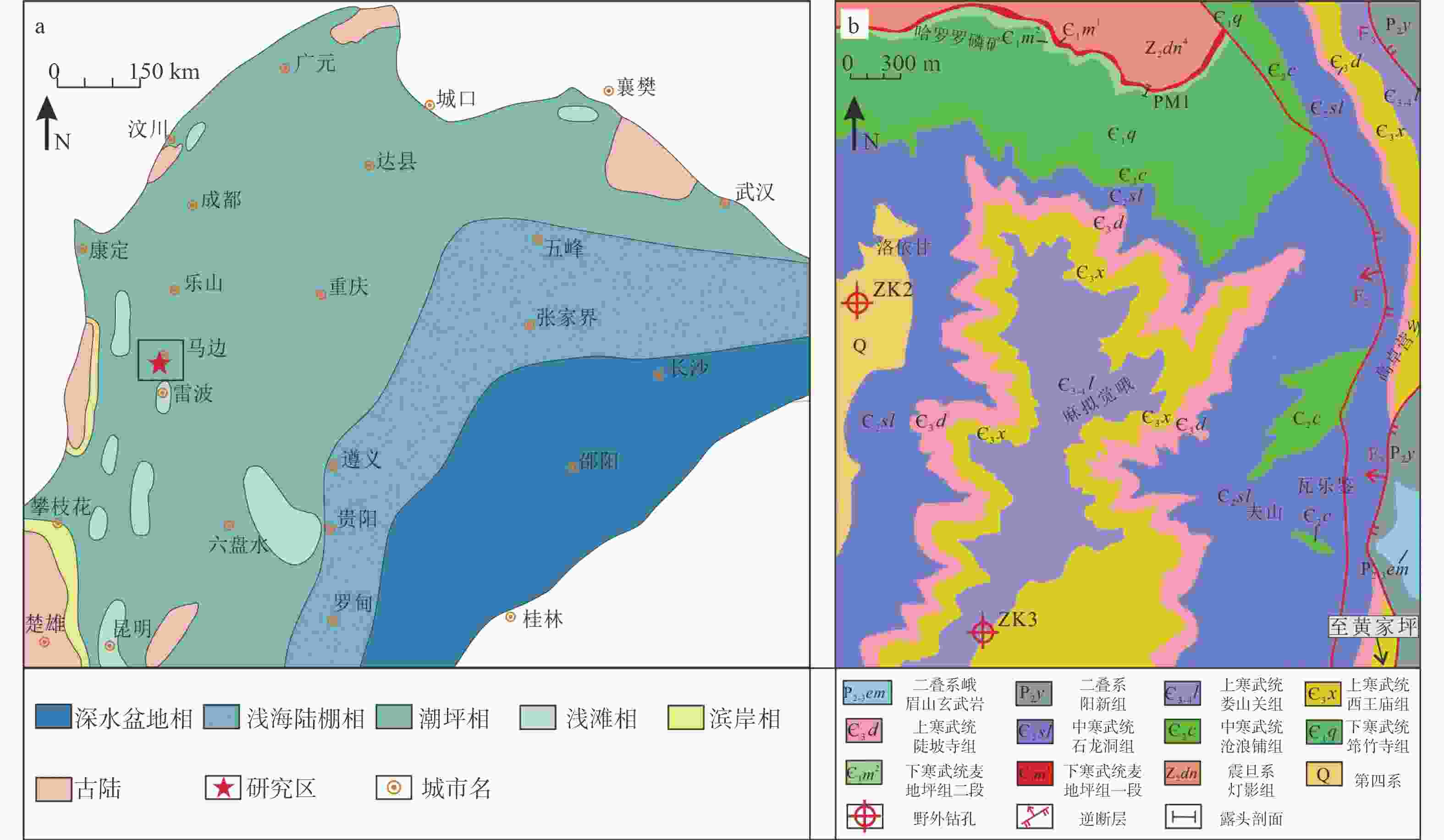
 下载:
下载:

